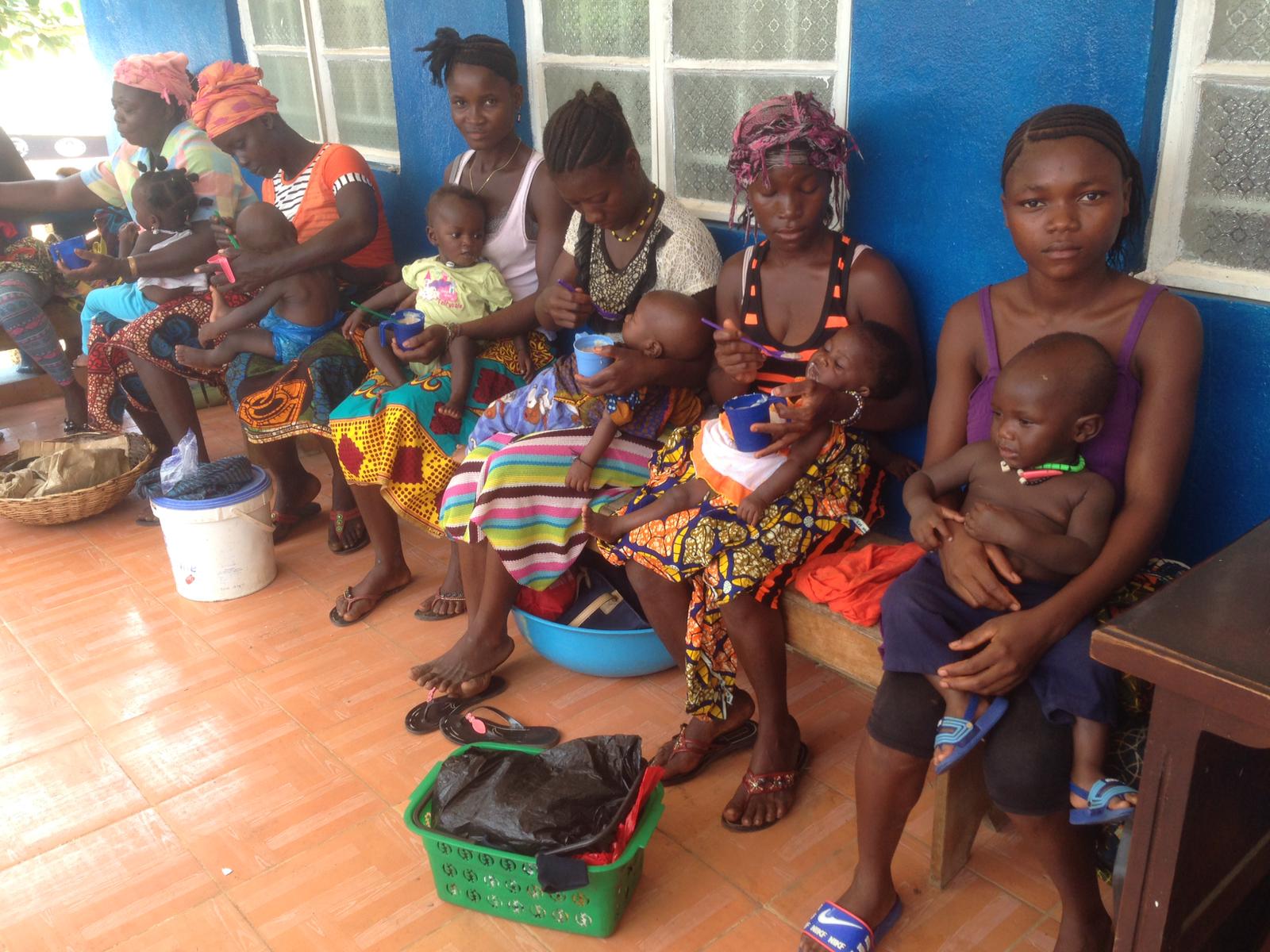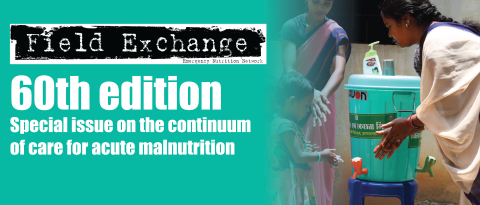Treatment of moderate acute malnutrition using food products or counselling: A systematic review
By Natasha Lelijveld, Alexandra Beedle, Arghanoon Farhikhtah, Eglal E. Elrayah, Jessica Bourdaire and Nancy Aburto
Natasha Lelijveld is a Teaching Fellow at the University of Southampton. Previously she worked on acute and chronic malnutrition research at the Hospital for Sick Kids in Toronto, University College London, the London School of Hygiene and Tropical Medicine, and the No Wasted Lives initiative at Action Against Hunger.
Alexandra Beedle has just graduated from the London School of Hygiene and Tropical Medicine with a Master’s in Nutrition for Global Health. Since graduating she has worked for several research consultancies and is about to join the South Sudan World Food Programme nutrition team.
Arghanoon Farhikhtah is a nutrition officer at the headquarters of World Food Programme. Her work focuses on linkages between food and nutrition security, infant and young child feeding, and implementation of innovative mobile solutions for nutrition data collection and behaviour change. She holds a Master of Science in Nutrition and Dietetics and is a registered dietician.
Eglal E. Elrayah is a medical doctor in community medicine with experience in clinical, operational and academic settings. She recently completed a Master’s in Community Medicine with advanced track in Primary Health Care and Mother and Child Health and is currently a lecturer at the Department of Community Medicine at the Al-Neelain University in Khartoum, Sudan.
Jessica Bourdaire has over 10 years of experience in the humanitarian nutrition sector. She holds a BSc in Nursing and an MSc in Nutrition. She currently works as a community-based management of acute malnutrition specialist at World Food Programme headquarters, supporting evidence generation on the treatment of acute malnutrition.
Nancy Aburto has over 15 years of experience working in the field of nutrition globally and is currently Chief of the Nutrition Specific Unit in the Nutrition Division of World Food Programme headquarters. She has a PhD in Nutrition and Health Sciences from Emory University and a Master’s Degree from University of Georgia.
Location: Global
What we know: There is a lack of international guidance on the most appropriate treatment for moderate acute malnutrition (MAM).
What this article adds: A 2018 systematic review synthesised current evidence on outcomes of MAM children treated with food interventions compared to no treatment or management with nutrition counselling. Since only one eligible study was identified, inclusion criteria were widened and 11 studies finally included. Seven studies found food products to be superior in terms of anthropometric outcomes compared to counselling and/or micronutrient powder supplementation; two studies found no significant benefit of a food product intervention compared to control; and two studies were inconclusive. Outcomes are likely influenced by type of supplementary food provided, dosage and length of treatment, as well as quality, content and adherence to counselling programmes. More research is needed in this area, especially studies that measure food insecurity and functional outcomes beyond anthropometric gains.
Introduction
There is currently a lack of international guidance on the most appropriate treatment for moderate acute malnutrition (MAM) and there are discrepancies in national treatment strategies. Some national guidelines for MAM treatment recommend the provision of supplementary food products, whereas others recommend that caregivers of MAM children should be provided with nutrition counselling alone. There is some debate about the necessity of supplementary foods for MAM and whether they result in better outcomes than no treatment or management with nutrition counselling. With the rise of non-communicable diseases in low-income settings and lack of understanding of the exact causes, confidence is needed in the effectiveness of MAM interventions to optimise immediate survival as well as long-term health (Shrimpton and Rokx, 2012). Moreover, food product interventions can be costly and unsustainable; therefore, concrete evidence is needed to establish their impact on child health outcomes compared to alternative methods.
This review aims to identify and synthesise the current evidence on outcomes of MAM children treated with food interventions compared to no treatment or management with nutrition counselling. Through identifying the current state of knowledge and highlighting evidence gaps, we hope to inform future research and international guidelines for the treatment of MAM.

Methods
We conducted a systematic literature review in October 2018, identifying studies that compared the treatment of MAM children (aged 6-59 months) with food products versus management with counselling or no intervention, using a predefined Population, Interventions, Control and Outcome (PICO) framework (Table 1). We searched Pubmed, Cochrane and ScienceDirect databases, as well as resources catalogued on the following websites: ENN, Valid International, Evidence Aid and State of Acute Malnutrition.
Table 1: PICO framework for search strategy

Results
We screened a total of 673 abstracts and identified one study that met the PICO framework. Due to this very limited number of eligible studies, we widened the inclusion criteria and identified two studies that provided micronutrient supplement powders to the control group, and eight studies that did not enrol children based on current, common definitions of MAM; however MAM children were part of the sample. For example, enrolment based on low weight-for-age or mid-upper arm circumference (MUAC) <12.9cm.
Seven of the 11 studies found food products to be superior with regard to anthropometric outcomes compared to counselling and/or micronutrient powder supplementation; two of the studies found no significant benefit of a food product intervention compared to control; and two of the studies were inconclusive. A summary of the results is presented in Table 2.
Table 2: Summary of review results

*RCT= randomised controlled trial. MNP= micronutrient powder. LRTI = lower respiratory tract infection. WSB++ = fortified wheat-soy blended flour. Z-scores are generated using WHO 2006 reference, unless otherwise stated.
Discussion
The majority of studies in this review found that food products resulted in greater anthropometric gains than counselling or micronutrient interventions. This was especially true if the supplementary food provided was of suitable quality and provided to the child for an adequate duration.
Lack of adherence to counselling programmes may be one of the limitations influencing their effectiveness among control groups in these studies. The “per protocol” analysis by Nikièma et al (2014) suggests that, if adhered to, the counselling programme may be as effective as the food intervention. One other study also stated high defaulting in the counselling group (Hossain and Ahmed, 2014); however no other studies presented per protocol analyses. Finding ways to improve adherence to counselling interventions needs to be explored. The standardisation of quality and content of nutrition counselling interventions also requires consideration.
It is important to note that the study by Nikièma et al (2014) was conducted in a “relatively food secure” context, which may be an important consideration for effective counselling interventions. One other study states that it was conducted in a relatively food-secure setting, taking place in an urban area of Iran (Javan et al, 2017). They found food supplementation with counselling to be superior to multivitamins and counselling; although there was some spontaneous recovery (WHZ>-2) (32%) in the counselling group, this was much lower than in the food supplementation group (80%). Three studies mention that their study populations are likely to be food insecure. Roy et al (2005) suggest that, although food supplementation had the best weight gain, an “intensive counselling” group still had better weight gain than the “standard counselling” group, despite low food security, whereas Christian et al (2015) conclude that counselling alone is not sufficient in areas of food insecurity.
Not all studies in this review found food supplements to be superior to nutrition counselling. The type of supplementary food provided, as well as the dosage and length of treatment, may influence their effectiveness. Studies specifically highlighted the micronutrient content and protein quality of supplements as likely significant factors. The majority of studies provided supplements for at least three months; however, one study provided one sachet of ready-to-use therapeutic food (RUTF) for 14 days and was found to be ineffective at preventing SAM in MAM children recovering from illness (van der Kam, 2017).
The results of this review suggest that food supplementation is superior for anthropometric improvements compared to counselling and/or micronutrients when the type of supplementary food provided, dosage and length of treatment are adequate. The quality, content and adherence to counselling programmes also requires consideration. These results can be used to guide policymakers when improving recommendations for MAM treatment. Researchers should also take note as there is currently a paucity of studies on this topic, especially those using standard definitions of MAM and recovery, as well as a lack of studies including measures of food security and important functional outcomes beyond anthropometric proxies.
For more information, please contact Natasha Lelijveld.
This study has now been published at:
Lelijveld, N, Beedle, A, Farhikhtah, A, Elrayah, EE, Bourdaire, J, Aburto, N. Systematic review of the treatment of moderate acute malnutrition using food products. Matern Child Nutr. 2020; 16:e12898. https://doi.org/10.1111/mcn.12898
References
Christian P et al. Effect of fortified complementary food supplementation on child growth in rural Bangladesh: a cluster-randomized trial. International journal of epidemiology, 2015. 44(6): p. 1862-1876.
Fauveau C et al. Limited impact of a targeted food supplementation programme in Bangladeshi urban slum children. Annals of tropical paediatrics, 1992. 12(1): p. 41-46.
Grellety E et al. Effect of mass supplementation with ready-to-use supplementary food during an anticipated nutritional emergency. PLoS One, 2012. 7(9): p. e44549.
Heikens GT et al. The Kingston project. I. Growth of malnourished children during rehabilitation in the community, given a high energy supplement. European Journal of Clinical Nutrition, 1989. 43(3): p. 145-160.
Hossain MI et al. Effects of community-based follow-up care in managing severely underweight children. Journal of pediatric gastroenterology and nutrition, 2011. 53(3): p. 310-319.
Hossain MI and Ahmed T. Efficacy of community-based follow-up, with or without food supplementation and psychosocial stimulation in the management of young moderately wasted Bangladeshi children. 2014.
Javan R, Kooshki A, Afzalaghaee A, Aldaghi M and Yousefi M (2017). Effectiveness of supplementary blended flour based on chickpea and cereals for the treatment of infants with moderate acute malnutrition in Iran: A randomized clinical trial. Electronic physician 9(12): 6078.
Nikièma L et al. Treating moderate acute malnutrition in first-line health services: an effectiveness cluster-randomized trial in Burkina Faso. The American journal of clinical nutrition, 2014. 100(1): p. 241-249
Roy SK et al. Intensive nutrition education with or without supplementary feeding improves the nutritional status of moderately-malnourished children in Bangladesh. Journal of Health, Population and Nutrition, 2005: p. 320-330.
Schlossman N et al. A randomized controlled trial of two ready-to-use supplementary foods demonstrates benefit of the higher dairy supplement for reduced wasting in mothers, and differential impact in infants and children associated with maternal supplement response. Food and nutrition bulletin, 2017. 38(3): p. 275-290.
Shrimpton R and Rokx C (2012). The double burden of malnutrition: a review of global evidence. World Bank.
van der Kam S. (2017). Does a short term nutritional supplementation prevent malnutrition in ill children? PhD thesis.


